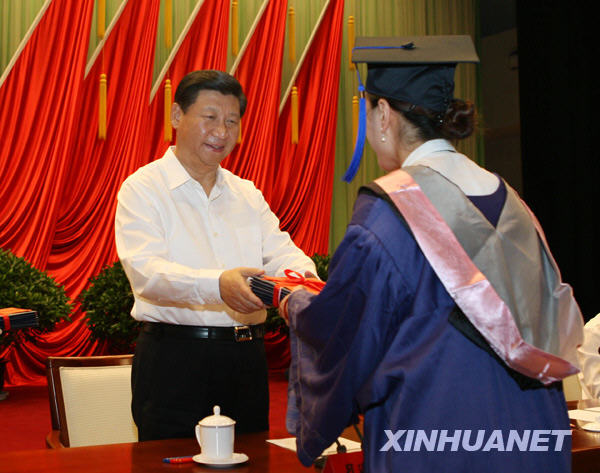Inside the Central Party School
|
Xi Jinping (left), president of the Party School of the CPC Central Committee, attends the graduation ceremony of the spring semester in 2009. [File photo] |
"Students are god of school."
"Students are gods at school." According to Jin Wei, teachers in the Party school are under extremely high pressure because their students -- often the current or future major leaders of the State, appraise all of their class performances.
Compared with provincial governors and ministers, students at a younger age and those from publicity departments are more active in class. They are also more critical about a teacher's performance. In the past a teacher, unable to keep his class going on because he failed to convince students of his opinions, lost his post. After the semester ended, the teacher received 37 points in a 100-point appraisal.
According to the current appraisal system, the full mark for a lecture is 10 points. Any lecture scored under nine is deemed a major malfunction of the teacher. If such an event occurs, proper administrative departments in the school will hold a meeting with all the teachers to resolve the problem.
The appraisal system was introduced into the school not long ago. Currently the school publishes each teacher's score at the end of each term. Xie Chuantao said in his department, if a teacher has a score lower than department's average, he or she would be suspended from teaching for a while. "Competition here is very tough. No one will feel good if his score is lower than others," said Xie.
In the school, teachers must have a sense of propriety about what they may say in class. All lectures should be given in the framework of the rules and policies of the Party. For Xu Xianglin, a professor engaged in the study of agriculture, farmers and the countryside, this requirement is not difficult to meet because "all teachers here support the policies". For Xu, the difficulty is how to properly convey his opinions to students.
On the other hand, some students still fear expressing their thoughts in class. A former student in the class for young and middle-aged officials said that he was always careful about his words because staff from the Organization Department of the CPC Central Committee often sat in the corner of the classroom. However, he admitted, "The outspoken ones have more chances of being promoted".
In this school, students in different classes have the rare opportunity to communicate with each other. Officials at the prefecture level and those at the provincial level eat in different canteens and live in different dormitory buildings. "I rarely saw my leaders on campus unless they asked me to attend meetings," recalled a middle-level official in the education system. When she attended classes at the school, Chen Zhili, the then minister of education, was also studying in the school. At that time, the minister grasped the chance and held several meetings with students from various education fields.
Since students in the school come from every part of the large country, an ideological gap is obvious between those from developed regions and underdeveloped regions. They tend to have different opinions for one issue. Professor Jin Wei recalled in one of her classes how she told the students that having extramarital sex would pose great risks to spreading AIDS. A student immediately retorted that if there were no direct touch, the AIDS virus would not be transmitted. However, another student later told Jin Wei that he was totally confused during class, because initially, he thought that the teacher had intended to educate them on self discipline. Fortunately, he finally realized that the teacher simply wanted to convey public health information.
 0
0 







